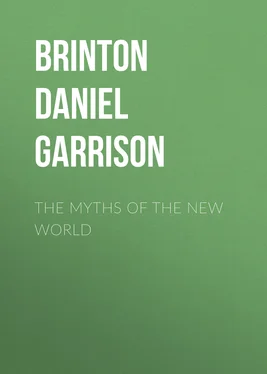Daniel Brinton - The Myths of the New World
Здесь есть возможность читать онлайн «Daniel Brinton - The Myths of the New World» — ознакомительный отрывок электронной книги совершенно бесплатно, а после прочтения отрывка купить полную версию. В некоторых случаях можно слушать аудио, скачать через торрент в формате fb2 и присутствует краткое содержание. Жанр: foreign_prose, История, Старинная литература, Мифы. Легенды. Эпос, foreign_edu, foreign_antique, на английском языке. Описание произведения, (предисловие) а так же отзывы посетителей доступны на портале библиотеки ЛибКат.
- Название:The Myths of the New World
- Автор:
- Жанр:
- Год:неизвестен
- ISBN:нет данных
- Рейтинг книги:5 / 5. Голосов: 1
-
Избранное:Добавить в избранное
- Отзывы:
-
Ваша оценка:
- 100
- 1
- 2
- 3
- 4
- 5
The Myths of the New World: краткое содержание, описание и аннотация
Предлагаем к чтению аннотацию, описание, краткое содержание или предисловие (зависит от того, что написал сам автор книги «The Myths of the New World»). Если вы не нашли необходимую информацию о книге — напишите в комментариях, мы постараемся отыскать её.
The Myths of the New World — читать онлайн ознакомительный отрывок
Ниже представлен текст книги, разбитый по страницам. Система сохранения места последней прочитанной страницы, позволяет с удобством читать онлайн бесплатно книгу «The Myths of the New World», без необходимости каждый раз заново искать на чём Вы остановились. Поставьте закладку, и сможете в любой момент перейти на страницу, на которой закончили чтение.
Интервал:
Закладка:
If with a hope of other views we turn to our magnificent national work on the Indians (History, Conditions, and Prospects of the Indian Tribes of the United States: Washington, 1851-9), a great disappointment awaits us. That work was unfortunate in its editor. It is a monument of American extravagance and superficiality. Mr. Schoolcraft was a man of deficient education and narrow prejudices, pompous in style, and inaccurate in statements. The information from original observers it contains is often of real value, but the general views on aboriginal history and religion are shallow and untrustworthy in the extreme.
A German professor, Dr. J. G. Müller, has written quite a voluminous work on American Primitive Religions ( Geschichte der Amerikanischen Ur-religionen , pp. 707: Basel, 1855). His theory is that “at the south a worship of nature with the adoration of the sun as its centre, at the north a fear of spirits combined with fetichism, made up the two fundamental divisions of the religion of the red race” (pp. 89, 90). This imaginary antithesis he traces out between the Algonkin and Apalachian tribes, and between the Toltecs of Guatemala and the Aztecs of Mexico. His quotations are nearly all at second hand, and so little does he criticize his facts as to confuse the Vaudoux worship of the Haitian negroes with that of Votan in Chiapa. His work can in no sense be considered an authority.
Very much better is the Anthropology of the late Dr. Theodore Waitz ( Anthropologie der Naturvœlker : Leipzig, 1862-66). No more comprehensive, sound, and critical work on the indigenes of America has ever been written. But on their religions the author is unfortunately defective, being led astray by the hasty and groundless generalizations of others. His great anxiety, moreover, to subject all moral sciences to a realistic philosophy, was peculiarly fatal to any correct appreciation of religious growth, and his views are neither new nor tenable.
For a different reason I must condemn in the most unqualified manner the attempt recently made by the enthusiastic and meritorious antiquary, the Abbé E. Charles Brasseur (de Bourbourg), to explain American mythology after the example of Euhemerus, of Thessaly, as the apotheosis of history. This theory, which has been repeatedly applied to other mythologies with invariable failure, is now disowned by every distinguished student of European and Oriental antiquity; and to seek to introduce it into American religions is simply to render them still more obscure and unattractive, and to deprive them of the only general interest they now have, that of illustrating the gradual development of the religious ideas of humanity.
But while thus regretting the use he has made of them, all interested in American antiquity cannot too much thank this indefatigable explorer for the priceless materials he has unearthed in the neglected libraries of Spain and Central America, and laid before the public. For the present purpose the most significant of these is the Sacred National Book of the Quiches, a tribe of Guatemala. This contains their legends, written in the original tongue, and transcribed by Father Francisco Ximenes about 1725. The manuscripts of this missionary were used early in the present century, by Don Felix Cabrera, but were supposed to be entirely lost even by the Abbé Brasseur himself in 1850 ( Lettre à M. le Duc de Valmy , Mexique, Oct. 15, 1850). Made aware of their importance by the expressions of regret used in the Abbé’s letters, Dr. C. Sherzer, in 1854, was fortunate enough to discover them in the library of the University of San Carlos in the city of Guatemala. The legends were in Quiche with a Spanish translation and scholia. The Spanish was copied by Dr. Scherzer and published in Vienna, in 1856, under the title Las Historias del Origen de los Indios de Guatemala, por el R. P. F. Francisco Ximenes . In 1855 the Abbé Brasseur took a copy of the original which he brought out at Paris in 1861, with a translation of his own, under the title Vuh Popol: Le Livre Sacré des Quichés et les Mythes de l’Antiquité Américaine . Internal evidence proves that these legends were written down by a converted native some time in the seventeenth century. They carry the national history back about two centuries, beyond which all is professedly mythical. Although both translations are colored by the peculiar views of their makers, this is incomparably the most complete and valuable work on American mythology extant.
Another authority of inestimable value has been placed within the reach of scholars during the last few years. This is the Relations de la Nouvelle France , containing the annual reports of the Jesuit missionaries among the Iroquois and Algonkins from and after 1611. My references to this are always to the reprint at Quebec, 1858. Of not less excellence for another tribe, the Creeks, is the brief “Sketch of the Creek Country,” by Col. Benjamin Hawkins, written about 1800, and first published in full by the Georgia Historical Society in 1848. Most of the other works to which I have referred are too well known to need any special examination here, or will be more particularly mentioned in the foot-notes when quoted.
CHAPTER II.
THE IDEA OF GOD
An intuition common to the species.—Words expressing it in American languages derived either from ideas of above in space, or of life manifested by breath.—Examples.—No conscious monotheism, and but little idea of immateriality discoverable.—Still less any moral dualism of deities, the Great Good Spirit and the Great Bad Spirit being alike terms and notions of foreign importation.
IF we accept the definition that mythology is the idea of God expressed in symbol, figure, and narrative, and always struggling toward a clearer utterance, it is well not only to trace this idea in its very earliest embodiment in language, but also, for the sake of comparison, to ask what is its latest and most approved expression. The reply to this is given us by Immanuel Kant. He has shown that our reason, dwelling on the facts of experience, constantly seeks the principles which connect them together, and only rests satisfied in the conviction that there is a highest and first principle which reconciles all their discrepancies and binds them into one. This he calls the Ideal of Reason. It must be true, for it is evolved from the laws of reason, our only test of truth. Furthermore, the sense of personality and the voice of conscience, analyzed to their sources, can only be explained by the assumption of an infinite personality and an absolute standard of right. Or, if to some all this appears but wire-drawn metaphysical subtlety, they are welcome to the definition of the realist, that the idea of God is the sum of those intelligent activities which the individual, reasoning from the analogy of his own actions, imagines to be behind and to bring about natural phenomena. 33 33 But there is no ground for the most positive of philosophers to reject the doctrine of innate ideas when put in a certain way. The instincts and habits of the lower animals by which they obtain food, migrate, and perpetuate their kind, are in obedience to particular congenital impressions, and correspond to definite anatomical and morphological relations. No one pretends their knowledge is experimental. Just so the human cerebrum has received, by descent or otherwise, various sensory impressions peculiar to man as a species, which are just as certain to guide his thoughts, actions, and destiny, as is the cerebrum of the insectivorous aye-aye to lead it to hunt successfully for larvæ.
If either of these be correct, it were hard to conceive how any tribe or even any sane man could be without some notion of divinity.
Certainly in America no instance of its absence has been discovered. Obscure, grotesque, unworthy it often was, but everywhere man was oppressed with a sensus numinis , a feeling that invisible, powerful agencies were at work around him, who, as they willed, could help or hurt him. In every heart was an altar to the Unknown God. Not that it was customary to attach any idea of unity to these unseen powers. The supposition that in ancient times and in very unenlightened conditions, before mythology had grown, a monotheism prevailed, which afterwards at various times was revived by reformers, is a belief that should have passed away when the delights of savage life and the praises of a state of nature ceased to be the themes of philosophers. We are speaking of a people little capable of abstraction. The exhibitions of force in nature seemed to them the manifestations of that mysterious power felt by their self-consciousness; to combine these various manifestations and recognize them as the operations of one personality, was a step not easily taken. Yet He is not far from every one of us. “Whenever man thinks clearly, or feels deeply, he conceives God as self-conscious unity,” says Carriere, with admirable insight; and elsewhere, “we have monotheism, not in contrast to polytheism, not clear to the thought, but in living intuition in the religious sentiments.” 34 34 Die Kunst im Zusammenhang der Culturentwickelung , i. pp. 50, 252.
Интервал:
Закладка:
Похожие книги на «The Myths of the New World»
Представляем Вашему вниманию похожие книги на «The Myths of the New World» списком для выбора. Мы отобрали схожую по названию и смыслу литературу в надежде предоставить читателям больше вариантов отыскать новые, интересные, ещё непрочитанные произведения.
Обсуждение, отзывы о книге «The Myths of the New World» и просто собственные мнения читателей. Оставьте ваши комментарии, напишите, что Вы думаете о произведении, его смысле или главных героях. Укажите что конкретно понравилось, а что нет, и почему Вы так считаете.












